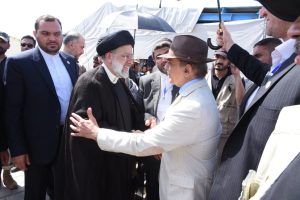Pakistan has approved barter trade with Iran, Afghanistan, and Russia to stabilize its economy and reduce the country’s dependence on dollar trade.
According to the Ministry of Commerce, the Barter Trade Mechanism will allow public and private entities to engage in Business to Business (B2B) trade with all three countries. “Trade of goods under a B2B BT [barter trade] arrangement shall be allowed on the principle of import followed by export. The export would be made to the extent of the value of imported goods, subject to the tolerance mechanism provided hereinafter for any exigency,” the notification said.
By engaging in barter trade with Iran and Russia, Pakistan can access goods and services it needs without having to depend on the U.S. dollar for transactions. That could increase Pakistan’s overall volume of trade with regional countries by providing a more efficient way to exchange goods and services without relying on cash transactions. Furthermore, it will enable Pakistan to eliminate barriers resulting from a lack of banking relationships with Iran and Russia. This is especially important since Islamabad plans to shift a large part of its oil imports to Russia.
Smuggling across Pakistan’s borders with Iran and Afghanistan is going on at a massive scale. Much foreign exchange is lost to this illegal trade. Reports indicate that smuggled Iranian oil has captured 25-30 percent of Pakistan’s diesel market.
The smuggling of fertilizer, sugar, and wheat to Iran and Afghanistan has become another problem for Pakistan. The Afghan Taliban’s ban on Pakistan’s rupee as legal tender in Afghanistan has contributed to this smuggling problem, which has forced exporters to trade in dollars. By reducing the costs associated with traditional trade, the barter system can reduce smuggling. It could emerge as a more attractive option to traders in both countries.
To increase its exports, Pakistan needs to think creatively and explore alternative means of trading with regional countries like Iran and Russia.
This is especially important given Pakistan’s current economic situation. The country is facing one of its most severe economic crises in recent years. With only a month’s worth of import cover, Pakistan could be pushed into a situation where it will not have enough money to pay its debts or provide basic services to its citizens. This would have far-reaching implications on the economy and people’s livelihoods.
The barter system will help strengthen Pakistan’s economy by increasing its exports and reducing its dependence on the U.S. dollar. Over the years, Pakistani business groups and barter trade operators have underlined the importance of transacting in currencies of friendly countries and reducing reliance on the dollar. Easing Pakistan’s dependence on the dollar could reduce its fiscal deficit and external debt incurred from international imports.
Analysts believe that the implementation of Pakistan’s decision on barter trade “in letter and spirit” could usher in a new era of regional integration. Dr. Zainab Ahmed, chairperson of the Department of International Relations at Lahore Garrison University, told The Diplomat that “barter trade would not only relieve this region of dependence on the dollar and export regulations but also promote people-to-people contacts that are crucial to regional economic integration.”
Due to the deepening barter trade in the region, energy connectivity will also increase, resulting in economic integration, she said.
However, Ahmed cautioned Pakistan to tread carefully as the United States may not approve of economic integration involving Moscow and Tehran, two of Washington’s key adversaries. Pakistan has been trying to build a gas pipeline with Iran for years, but so far, the U.S. has not responded positively to the request. This is mainly due to the sanctions imposed by Washington on Tehran. As a result, Pakistan has had to look for alternative sources of natural gas to meet its energy needs. However, these are more expensive options than importing Iranian gas via a pipeline.
In any case, barter trade with Iran, Russia, and Afghanistan is likely to have far-reaching implications for the Pakistani economy as well as its foreign policy in the long run. It remains to be seen how this move will affect other countries in the region, particularly those who may also be looking to increase their trade ties with Iran and Russia.













